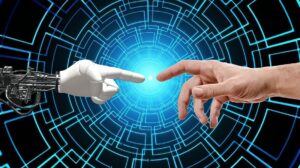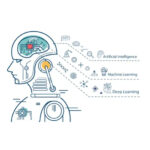In today’s rapidly evolving world, technology is at the forefront of transforming various sectors, including education. Artificial Intelligence (AI) has emerged as a revolutionary force, holding the potential to reshape traditional educational paradigms. Integrating AI into school curricula is no longer a futuristic concept; it’s becoming the new normal. This article explores the growing role of AI in school curriculum and the implications of this transformative technology on education.

The Rise of AI in Education
AI, often referred to as the ‘fourth industrial revolution,’ is altering the landscape of education in profound ways. Traditionally, education has been linear and uniform, but AI introduces personalization and adaptability. Here are some key areas where AI is making its mark in the realm of education:
Personalized Learning: AI-powered platforms analyze students’ learning patterns and adapt content and pacing accordingly. This ensures that each student receives an education tailored to their needs, fostering better understanding and engagement.
Intelligent Tutoring Systems: AI-driven virtual tutors are providing students with real-time assistance and feedback. These systems can identify areas where a student may struggle and offer additional resources or practice exercises to reinforce learning.
Data-Driven Insights: AI collects and analyzes data on student performance, helping teachers make data-informed decisions about curriculum and instructional strategies. This enhances the effectiveness of teaching and learning.
Language Learning: AI-powered language learning apps and platforms use natural language processing to improve students’ language skills, making language acquisition more efficient and engaging.
Automating Administrative Tasks: AI can handle administrative tasks such as grading, scheduling, and resource allocation, freeing up educators to focus more on teaching and mentoring.
The Benefits of AI in School Curriculum
The integration of AI into school curriculum brings about numerous benefits for students, educators, and educational institutions:
Personalized Learning: AI enables students to learn at their own pace, ensuring a deeper understanding of the material and greater engagement.
Efficient Resource Allocation: Educational institutions can optimize resource allocation based on data-driven insights, leading to cost savings and improved outcomes.
Access to High-Quality Education: AI can bridge gaps in educational access by providing high-quality content and instruction to students in remote or underserved areas.
Teacher Support: Educators can benefit from AI-powered tools that help them identify struggling students and provide targeted support, ultimately improving teaching effectiveness.
Lifelong Learning: AI in education fosters a culture of lifelong learning by making educational resources accessible to individuals of all ages.
The Challenges and Concerns
While the potential benefits of AI in school curriculum are substantial, it’s crucial to address the challenges and concerns associated with its implementation:
Data Privacy: The collection and use of student data by AI systems raise concerns about data privacy and security. Stricter regulations and safeguards are necessary to protect students’ sensitive information.
Equity and Accessibility: Ensuring that AI-driven education is accessible to all students, regardless of socioeconomic status or geographic location, is a challenge that requires careful consideration.
Teacher Training: Educators need training and professional development to effectively integrate AI tools into their teaching practices.
Ethical Considerations: AI algorithms can inadvertently reinforce biases present in data. Careful monitoring and ethical oversight are essential to prevent discrimination in AI-driven education.
The integration of AI into school curriculum is no longer a distant vision; it is becoming a fundamental part of the modern education system. While challenges and concerns exist, the potential benefits of personalized learning, efficient resource allocation, and improved teacher support are too significant to ignore. As we embrace AI in education, it is essential to strike a balance between harnessing its potential and addressing ethical and equity considerations. The future of education is undoubtedly being shaped by AI, making it a powerful tool in preparing students for the ever-changing world ahead.


